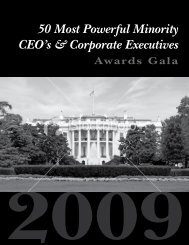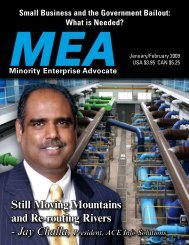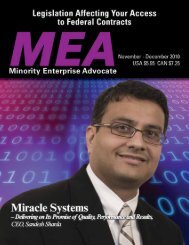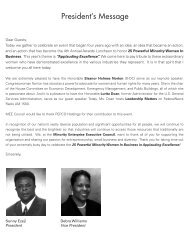Cultivating The Leader Within - Minority Enterprise Executive Council
Cultivating The Leader Within - Minority Enterprise Executive Council
Cultivating The Leader Within - Minority Enterprise Executive Council
- No tags were found...
Create successful ePaper yourself
Turn your PDF publications into a flip-book with our unique Google optimized e-Paper software.
Q: I’ve heard that the rules for SBA<br />
8(a) mentor-protégé joint ventures are<br />
different. Is that true<br />
A: Yes, joint ventures between an SBAapproved<br />
mentor and 8(a) protégé team<br />
are permitted to pursue small-business<br />
contract awards, regardless of the<br />
mentor’s size, as long as the protégé is<br />
small under the applicable size standards.<br />
Protests<br />
As a business owner you can be on either<br />
side of the protest issue and you need<br />
to be prepared for both possibilities. <strong>The</strong><br />
“urban legend” is that all protests are bad<br />
no matter what side you are on and that<br />
is simply not true. Protests, unfortunately<br />
or not, are a way of life in the world of<br />
federal contracting and, in fact, some<br />
companies consider filing protests as part<br />
of their normal business strategy. Since it<br />
is important not to live in fear of protests<br />
the comments below by Terry Murphy,<br />
Chairman of the Kaufman & Canoles<br />
Government Contracts and Construction<br />
Practice Group, should take away some<br />
of the mystery surrounding this issue.<br />
When asked about protests in general<br />
Terry said:“One of the most important<br />
differences between commercial and<br />
government contracting is the ability of<br />
an unsuccessful contractor to protest the<br />
award of a contract. Some contractors<br />
say it is never wise to file a protest<br />
as it may alienate your Government<br />
customer. Nevertheless, in this era<br />
of declining budgets, bid protests are<br />
a course of doing business if you are<br />
a government contractor. A protest<br />
handled professionally and efficiently,<br />
without emotion, is a necessary option<br />
to be considered by all contractors.”<br />
Q: What are some of the common<br />
protest areas<br />
A: Common protest issues involve<br />
challenges to the Government’s failure<br />
to follow the evaluation criteria either<br />
through an unreasonable evaluation of<br />
the contractor’s proposal or a challenge<br />
of the evaluation of the successful<br />
offeror’s proposal.<br />
Q: I’ve been told that the timeliness of your<br />
protest action is critical. Is that the case<br />
A: Yes, a key issue in filing a bid protest<br />
involves timeliness. Pre-award protests<br />
challenging a request for proposal<br />
must be filed prior to the submission<br />
of your offer or it will be untimely. <strong>The</strong>re<br />
also are very short deadlines for a postaward<br />
protest depending on the place<br />
the protest is filed.<br />
Q: How do you make the right business<br />
decision when it comes to protests<br />
A: A contractor should weigh the<br />
likelihood of success and costs before<br />
filing a protest. An often overlooked<br />
consequence for new contractors who<br />
are still euphoric over the award of a new<br />
contract is the surprise that their award<br />
has been protested (and is subject to a<br />
stop work order). In other words, the<br />
successful contractor is dragged into<br />
a protest it did not file. A successful<br />
awardee should always then consider<br />
“intervening” or filing to become a<br />
party to the protest to work with the<br />
agency to preserve the contract award.<br />
Ethics<br />
Another regulatory area is ethics,<br />
both business and personal. Almost<br />
every solicitation issued by the federal<br />
government requires that you address<br />
any business (organizational) “conflicts<br />
of interest” (OCI) and, now, there are<br />
new regulations pertaining to “personal<br />
conflicts of interest” (PCI). Pat O’Donnell,<br />
whose practice focuses on the ethics<br />
rules in government contracting, lays<br />
out how both of these ethical areas are<br />
addressed by the government and what<br />
you can do to mitigate any concerns about<br />
not complying with these regulations.<br />
Q: Where can I learn about the regulatory<br />
details about conflicts of interest<br />
A: FAR Subpart 9.5 (https://www.<br />
acquisition.gov/far) addresses<br />
organizational conflicts of interest. <strong>The</strong>se<br />
regulations are specifically designed to<br />
maintain competitive fairness and to avoid<br />
situations in which a contractor’s advice<br />
to the government may be biased. Also,<br />
as of November 2, 2011, a new rule (FAR<br />
Subpart 3.1101 and FAR 52.203-16(a))<br />
addresses personal conflicts of interest<br />
for government contractors and their<br />
employees performing procurement<br />
related functions.<br />
Q: What is meant by an organizational<br />
conflict of interest<br />
A: Organizational Conflicts of Interest<br />
(OCI’s) fall primarily into two categories:<br />
the existence of conflicting roles that<br />
might bias a contractor’s judgment<br />
and unfair competitive advantage due<br />
to obtaining proprietary information<br />
without proper authorization or<br />
obtaining source selection information<br />
not available to all competitors.<br />
Q: How is the area of personal conflicts<br />
of interest different<br />
A: <strong>The</strong> new rule regarding Personal Conflicts<br />
of Interest (PCI’s) applies to government<br />
contractors (and their employees) who<br />
perform work related to “acquisition<br />
functions closely associated with inherently<br />
governmental functions” such as:<br />
• Planning acquisitions<br />
• Determining what supplies or<br />
services will be acquired by the<br />
Government<br />
• Drafting statements of work<br />
• Developing or approving contract<br />
documents or evaluation criteria<br />
• Evaluating proposals or contract<br />
performance<br />
• Awarding contracts<br />
• Administering or terminating<br />
contracts<br />
In closing Pat said: Contractors<br />
must implement a system whereby<br />
employees who perform such functions<br />
disclose personal conflicts that might<br />
impair their ability to act impartially and<br />
in the best interest of the Government.<br />
As with all contractor business ethics<br />
requirements, the contractor must<br />
train its employees on identifying and<br />
disclosing potential personal conflicts of<br />
interest. Also, contractors are required<br />
to self-report employee violations.”<br />
As you can see from above, there are many<br />
important issues that you must consider<br />
and educate yourself about as you work to<br />
move your business to the next level. <strong>The</strong><br />
wrong approach would be to ignore these<br />
issues or hope they don’t impact your<br />
business. You need to proactive learning<br />
about affiliation, protests, and ethics and<br />
seeking professional advice when needed.<br />
None of these concerns should be “show<br />
stoppers” for you moving down your path<br />
to greater federal contracting success.<br />
Now that you know about these issues<br />
take the time to dig deeper and learn<br />
more. It is time well spent. You will be a<br />
better contractor and teaming partner, and<br />
the unknown perceived dangers will be<br />
out of the shadows and in the light for you<br />
to address.<br />
10 <strong>Minority</strong> <strong>Enterprise</strong> Advocate • March – April 2012








